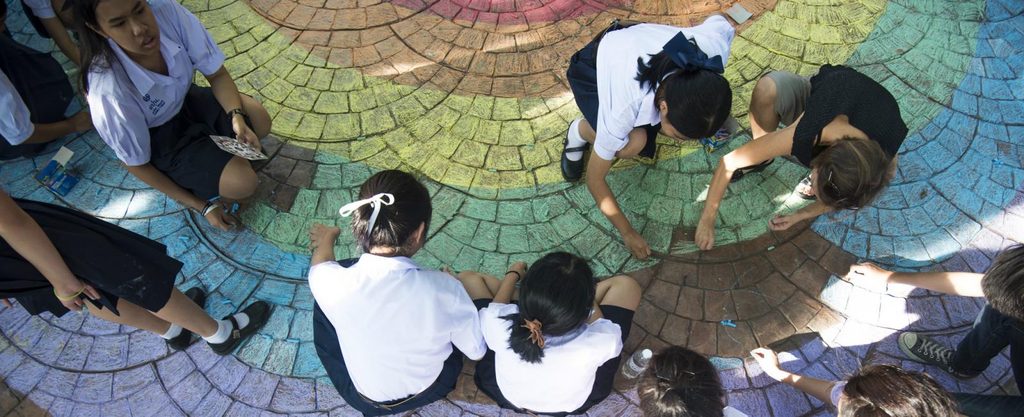How to be a gender equality and LGBTIQ+ ally
Gonzalo shares his top tips on how you can be both a gender equality and LGBTIQ+ ally.
We believe all children and young people should be able to live a life free from discrimination, violence and stigma, in all their diversity and regardless of their sexual orientation, gender identity and expression and sex characteristics (SOGIESC).
However, young people with diverse SOGIESC are among the most marginalised and excluded members of society. They are particularly vulnerable to stigma, violence and discrimination, due to their actual or perceived sexual orientation, gender identity and expression, and sex characteristics.
Discrimination, violence and exclusion experienced by people of diverse SOGIESC are often compounded by intersecting factors that drive inequality, such as racism, imperialism and ableism.
Children and young people with diverse SOGIESC still experience social and economic exclusion and marginalisation. This can have lasting consequences on their wellbeing and ability to thrive.

Children create a chalk rainbow on International Day against Homophobia, Biphobia and Transphobia, Thailand. Photo credit: UNAIDS / A.Martin.
Young people with diverse SOGIESC are at risk of stigma, discrimination and violence, often to an extreme level. This is fuelled by harmful social norms and practices, legal challenges and gender inequality.
Challenges related to identifying as LGBTIQ+ often combine with other factors of exclusion, such as age, race, and religion, disability, making gender inequality and exclusion often worse for LGBTIQ+ youth.
Harmful views are sometimes promoted to young people by those central to their lives, such as their peers, parents, teachers or religious leaders. However, these groups can also be valuable in driving the change in society that leads to inclusion for all children.
A newly developed module in our Champions of Change programme will allow young people to discuss sexual orientation and gender identity, increase their knowledge about rights and develop their skills to take a stand for and with LGBTIQ+ young people.
Stigma and discrimination can negatively impact the rights of LGBTIQ+ youth. In addition to their fundamental right to live free from violence and discrimination, bullying can lead to an increased likelihood of avoiding school and of low personal and academic self-esteem.
This can then also limit future employment options for LGBTIQ+ people. In some contexts, the challenges of identifying as LGBTIQ+ can lead to an increased risk of homelessness or increased likelihood of entering sex work as a means to survive.
LGBTIQ+ youth are at higher risk of threats and verbal, physical and sexual abuse and yet may be unable to secure help and support from those whose duty it is to protect the community.
There are often extra challenges in accessing proper sexual health services due to discrimination or lack of expertise among service providers. Sex education, if there is any at all, is often heteronormative (seeing heterosexuality as the norm in society) and not address the needs of LGBTIQ+ youth.
In 2014, Plan International Thailand, UNESCO and the Mahidol University conducted research on homophobic transphobic bullying in secondary schools highlighting gaps in protecting those who identify as LGBTIQ+.
This research formed the basis of a 3 year programme involving young people, parents, local organisations, schools and the government to prevent bullying and violence and make educational institutions safer for LGBTIQ+ youth.
Our Champions of Change programme is active in 20 countries and aims to advance gender equality by empowering girls and working with boys to challenge the harmful, dominant masculinities that perpetuate discrimination.
Research into homophobic and transphobic bullying in Thailand’s school system has led to a 3-year project involving schools, students, parents, local organisations and the government to address violence against young people who are or are perceived to be LGBTIQ+.
In Benin, we are working with the Global Fund to raise awareness, increase the conversation and communication around HIV/AIDS and improve access to treatment and education about prevention among the community, including those who identify as LGBTIQ+.
In El Salvador, we are working with the Global Fund to support HIV/AIDS at risk or affected communities through mobile health clinics and counselling. We are also working with transgender activists in the fight for an identity law to be passed that will allow them to be legally recognised as their self-identified gender.
In Peru, youth, including LGBTIQ+ youth, are empowered to be the principal advocates for their own sexual and reproductive rights. We are working with youth organisations and local authorities to raise awareness and take a stand to promote equal access to health services free from discrimination on the basis of sexual orientation and gender identity.
Plan International uses the term SOGIESC in order to be more inclusive of people whose diversity is not reflected in LGBTIQ+ categories. We recognise that people with diverse SOGIESC may have a range of terms in their own languages, may use other phrasing or may prefer another version of the LGBTIQ+ acronym. Plan International respects the language choices made by people with diverse SOGIESC and will adapt to use preferred terminology in different countries and contexts.